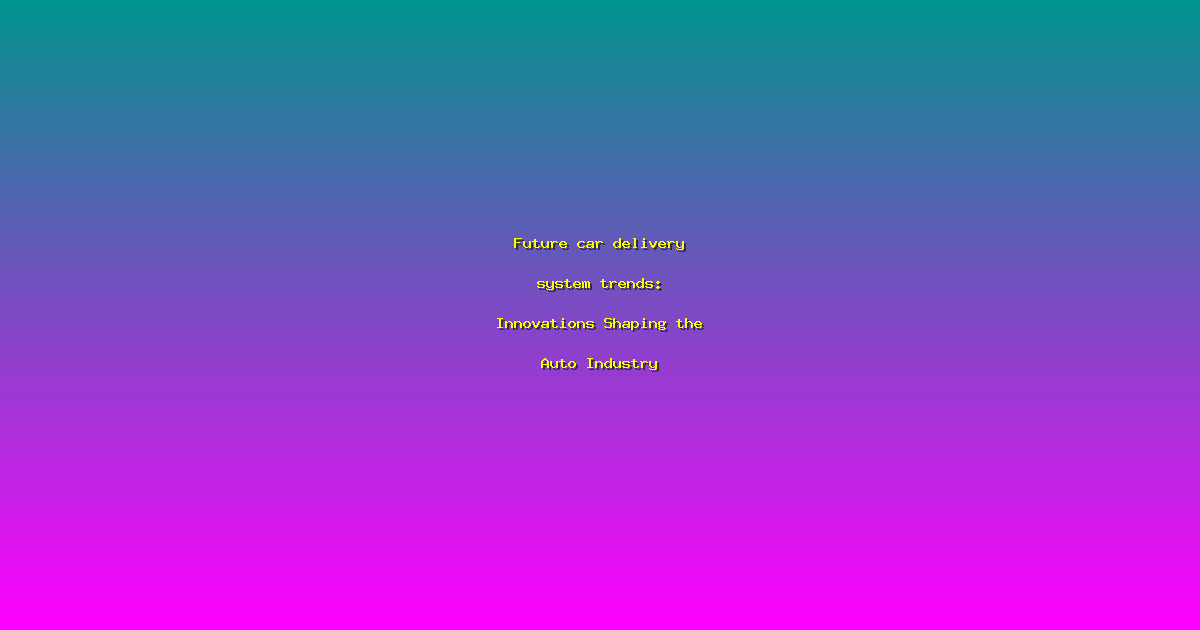Future Car Delivery System Trends: Innovations Shaping the Auto Industry
The automotive industry is continuously evolving, driven by technological advancements and changing consumer preferences. The way cars are delivered to consumers is no exception. From the rise of autonomous delivery vehicles to the implementation of modular design and subscription-based car ownership, the future of car delivery systems is as dynamic as ever. This article explores the key trends that are shaping the future of how cars are delivered to consumers.
Autonomous Delivery Vehicles
The integration of autonomous technology in the automotive sector is not limited to the cars themselves but also extends to the delivery process. Companies are experimenting with autonomous delivery vehicles to transport cars to dealerships or directly to customers. These vehicles can operate 24/7, reducing logistics costs and increasing the efficiency of car delivery processes.
Modular Design and Manufacturing
Modular design is emerging as a transformative trend in the automotive industry. By designing cars in modular parts, manufacturers can optimize the delivery process, allowing for quicker assembly and customization at the point of delivery. This approach not only reduces the burden on transportation but also enables a more flexible and personalized delivery experience for the consumer.
Subscription Models
The rise of subscription models in the automotive industry is changing how consumers interact with cars. Subscription services allow users to have access to a car without the need for ownership, which can significantly alter the delivery and distribution methods of vehicles. This shift towards on-demand usage and service-based models is likely to further evolve the delivery systems in the automotive industry.
Sustainability and Green Delivery
As environmental concerns become more pressing, the automotive industry is increasingly focusing on sustainable practices. This includes the delivery process, where companies are exploring greener solutions such as electric delivery vehicles or even carbon offsetting for delivery emissions. Embracing these sustainable delivery methods not only reduces the environmental impact but also aligns with the growing consumer demand for eco-friendly products.
Enhanced Customer Experience
The future of car delivery systems heavily focuses on enhancing the customer experience. This can involve personalized delivery options, such as having cars delivered to one's doorstep or to a preferred location. Additionally, integrating digital technologies to provide real-time updates and tailored services during the delivery process can significantly improve customer satisfaction.
FAQs
What is the primary benefit of using autonomous delivery vehicles in the automotive industry?
Autonomous delivery vehicles can reduce logistics costs and increase the efficiency of car delivery processes by operating around the clock without the need for human drivers.
How does modular design impact the delivery process?
Modular design allows for the efficient transport of car components, reducing the overall size and weight of the shipment, and enabling quicker and more flexible assembly at the point of delivery.
What is a subscription model in the context of car delivery?
A subscription model allows users to access a car without ownership, often involving a monthly fee. This model changes the traditional delivery approach by potentially reducing the need for large-scale deliveries and focusing on service provision.
What are some of the environmental benefits of green delivery methods?
Green delivery methods, such as using electric vehicles or offsetting carbon emissions, help reduce the environmental impact of car delivery, contributing to a more sustainable automotive industry.
How does technology play a role in enhancing the customer experience during car delivery?
Technology, such as real-time tracking apps and digital services that offer tailored delivery options, can significantly improve customer satisfaction by providing a more personalized and efficient delivery experience.
How will these trends affect the traditional dealership model?
These trends could lead to a shift away from the traditional dealership model, potentially reducing the need for physical dealerships by offering more direct-to-consumer delivery and subscription-based services.
Conclusion and Call-to-Action
The future of car delivery systems is set to be revolutionized by a combination of technological advancements and changing consumer behaviors. As the industry continues to evolve, staying informed about these trends and participating in the development of sustainable and customer-centric delivery systems will be crucial. Join the conversation on how these innovative delivery systems can enhance the automotive industry and contribute to a more sustainable future.

